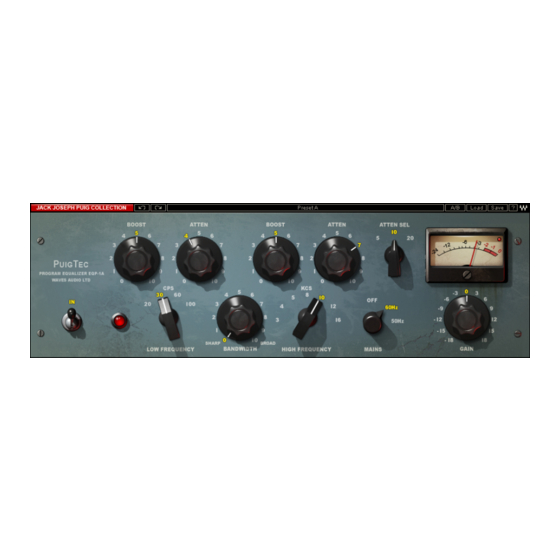
Table of Contents
Advertisement
Advertisement
Table of Contents

Subscribe to Our Youtube Channel
Summary of Contents for Waves PuigTec EQP-1A
- Page 1 Waves PuigTec EQP-1A User Manual...
-
Page 2: Table Of Contents
NTERFACE ONTROLS Toggle Buttons ...14 Value Window Buttons ...15 Sliders ...15 Hover Box ...15 Multiple Selection of Controls ...15 TAB Functions ...16 APPENDIX A – PUIGTEC EQP-1A CONTROLS ...17 TABLE OF CONTENTS ...9 ...10 ...12 Waves PuigTec EQP-1A User Manual... -
Page 3: Chapter 1 - Introduction
Chapter 1 – Introduction 1.1 Welcome Thank you for choosing Waves! In order to get the most out of your Waves processor, please take the time to read through this manual. In conjunction, we also suggest that you become familiar with www.wavesupport.net. There you will find an extensive Answer Base, the latest Tech Specs, detailed Installation guides, new Software Updates, and current information on Authorization and Registration. -
Page 4: Product Overview
EQP-1A. Conceived and created for broadband equalization, the EQP-1A features four low boost/cut frequencies, three high-cut frequencies and seven HF boost points, along with a bandwidth control for shaping the high boost curve. Waves PuigTec EQP-1A User Manual... -
Page 5: About The Modeling
• Waves modeled both 50Hz power current and 60Hz power current. If you listen closely, you will hear that there is a difference in hum level between 50Hz and 60Hz. Since hum is unique to each region and dependent upon the local electrical conditions, you may find that the modeled hum is different than the hum already present in your studio, and may not be suitable for your particular use. - Page 6 Below is a plot of the curve from the original Pultec EQP-1A, with all gains set to 0 and low cutoff set to 20hz (red) and cutoff at 100hz (yellow). Waves PuigTec EQP-1A User Manual...
-
Page 7: Components
1.4 Components WaveShell technology enables us to split Waves processors into smaller plug-ins, which we call components. Having a choice of components for a particular processor gives you the flexibility to choose the configuration best suited to your material. The PuigTec EQP-1A has two component processors: •... -
Page 8: Chapter 2 - Quickstart Guide
Hi Band Boost offers a high bell boost with 7 cutoff points and adjustable Q (bandwidth control). • Hi Band Attenuation offers high shelf attenuation at 3 cutoff points. • Gain controls level trimming. • The Output meter displays peak output level. Waves PuigTec EQP-1A User Manual... -
Page 9: Chapter 3 - Interface And Controls
Chapter 3 – Interface and Controls 3.1 PuigTec EQP-1A Interface Waves PuigTec EQP-1A User Manual... -
Page 10: Puigtec Eqp-1A Controls
Hi Bell Boost Range 0-11 (20 dB boost, 0.1 steps) Default Hi Bell Bandwidth (Q) Range 0-11 (0=sharp, 11=wide) Default Hi Bell Frequency Range 3kHz, 4kHz, 5kHz, 8kHz, 10kHz, 12kHz, 16kHz Default 3kHz Filter types Bell Waves PuigTec EQP-1A User Manual... - Page 11 60 Hz Gain controls the trim level. Range -18dB to +18dB (in 0.1dB steps) Default Meter displays output level in dBFS. The LED located in the upper right corner lights up when output signal is clipping. Waves PuigTec EQP-1A User Manual...
-
Page 12: Chapter 4 - The Wavesystem
All Waves processors feature the WaveSystem toolbar which takes care of most administrative functions you will encounter while working with your Waves software. The features of the WaveSystem toolbar are the same on practically all Waves processors, so familiarity with its features will be helpful whichever processor you are using. -
Page 13: Loading Presets And Setups
Save the current settings into a User Preset that will always be in your Load menu (until deleted). You will be prompted to give this preset a name. User Presets are stored in the plug-in’s preference file. Waves PuigTec EQP-1A User Manual... -
Page 14: Deleting Presets
(bypass, solo, or monitoring toggles) illuminate when the control is active. Some processors have link buttons between a pair of toggle buttons, allowing click-and-drag adjustment while retaining the offset between the controls. Waves PuigTec EQP-1A User Manual... -
Page 15: Value Window Buttons
Alternatively, you can hold down Shift while clicking the mouse on any control you wish to link. This second method is useful when you want to select two (or more) controls that are separated on the GUI by other controls you do not wish to select. Waves PuigTec EQP-1A User Manual... -
Page 16: Tab Functions
Additionally, the Mac has an option-TAB function for ‘down’ movement and shift-option-TAB for ‘up’ movement where applicable. If you have several Value Window Buttons selected, TAB functions will take you through the selected controls only. Waves PuigTec EQP-1A User Manual... -
Page 17: Appendix A - Puigtec Eqp-1A Controls
Appendix A – PuigTec EQP-1A Controls Control Low Band Boost Low Band Atten Low Band Frequency Hi Bell Boost Hi Bell Bandwidth (Q) Hi Bell Frequency High Shelf Atten High Shelf Frequency (Atten Sel) Output Mains Range 0 to 11 (18 dB boost, 0.1 steps) 0 to 11 (18 dB boost, 0.1 steps)







Need help?
Do you have a question about the PuigTec EQP-1A and is the answer not in the manual?
Questions and answers